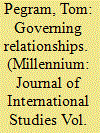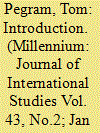| Srl | Item |
| 1 |
ID:
141207


|
|
|
|
|
| Summary/Abstract |
The global human rights regime has undergone extraordinary expansion in the last thirty years. It is particularly notable for its profusion of state and non-state actors and levels of formal articulation. This article seeks to make legible the human rights governance architecture from the global to the local level, within an issue-specific domain. Orchestration theory is employed as a general mode of governance, with application across political units and political levels. Orchestration applies when a focal actor enlists and supports third-party actors to address the target indirectly in pursuit of shared governance objectives. Using the UN Optional Protocol to the Convention Against Torture (OPCAT) as an example, the article explores the authority relationship across two central political units (the orchestrator and intermediary), with a focus on how this new global human rights architecture may offer a way of bridging the steps separating international instruments from practices on the ground.
|
|
|
|
|
|
|
|
|
|
|
|
|
|
|
|
| 2 |
ID:
141205


|
|
|
|
|
| Summary/Abstract |
Global governance is in flux. Scholarship on the practice of global governance has reimagined it as a realm of disputes and confrontation, rather than one of interest-alignment within multilateral interstate forums. A profound sense of governance deficit is provoking critical reflection both within the corridors of power and among practitioners and scholars. A call within academic circles for renewed reflection on global governance as a practice-oriented scholarship has elicited varied responses from the international relation (IR) fraternity. In taking stock of the state of the art of ‘global governance theory’, a number of scholars have advocated for its revival to be grounded in the kind of critical reflection often absent from mainstream IR discussion. Others contest any meaningful demarcation between IR and global governance scholarship. This forum responds to a number of converging developments. Situating contributions broadly within the notion of an interregnum, it is a first cut towards a more innovative global governance research and practice-oriented agenda. We focus, in particular, on reframing the problematique of global governance from one dominated by multilateral interstate geopolitics, towards a critical reappraisal of both structure and political economy in light of the evident complexity of global governance systems.
|
|
|
|
|
|
|
|
|
|
|
|
|
|
|
|
| 3 |
ID:
147551


|
|
|
|
|
| Summary/Abstract |
To reach agreement, international negotiators often compromise by using flexible language: they make controversial provisions vague, or add options and caveats. Does flexibility in agreement language influence subsequent state behavior? If so, do states follow both firm and flexible language somewhat, as negotiators hope? Or do governments respond strategically, increasing their energies on firmly specified tasks, and reducing their efforts on flexibly specified ones? Testing theories about agreement language is difficult because states often reserve flexible language for controversial provisions. To make causal claims, we study an unusually drafted agreement in which states had almost no opportunity to dilute agreement language. We examine the influence of the 1991 Paris Principles on the Design of National Human Rights Institutions (NHRIs), using an original data set of twenty-two institutional safeguards of NHRIs in 107 countries, and case studies. We find that variations in agreement language can have large effects on state behavior, even when the entire agreement is nonbinding. Both democracies and authoritarian states followed the principles' firm terms closely. However, authoritarian states either ignored or reduced their efforts on flexibly specified tasks. If flexibly specifying a task is no different from omitting it altogether, as our data suggest, the costs of compromise are much greater than previously believed.
|
|
|
|
|
|
|
|
|
|
|
|
|
|
|
|